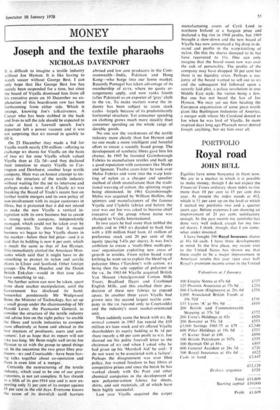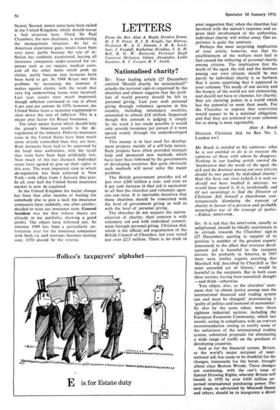PORTFOLIO
Royal road
JOHN BULL
Equities have some buoyancy in them now. We are in a market in which it is possible to make money, though I do not expect the Financial Times ordinary share index to rise more than 10 per cent to 15 per cent this year. At present the index stands at 412, which is 5+ per cent up on the level at which I started my portfolio two and a quarter years ago. Before expenses I am showing an improvement of 21 per cent; satisfactory enough. In the past month my portfolio has done very well indeed, except for my two oil shares. J think, though, that I am some- what under-invested.
I have bought 300 Royal Insurance shares at 41s 6d each. I have three developments in mind. In the first place, my recent visit to the United States has shown me that there ought to be a major improvement in American results this year (just over half Royal's premium income arises in the United
Valuations at 3 January
100 Empire Stores at 67s 6d ... £337 125 Phoenix Assurance at 37s 9d ... £236 500 Clarkson (Engineers) at 21s 6d £538 1,000 Associated British Foods at lOs 9id £541 133 Lyons 'A' at 91s 9d ... ... £610 200 British and Commonwealth Shipping at 37s 3d ... £372 200 Forte's Holdings at 62s £620 200 Bowater at 55s 3d £553 £3,000 Savings 1965-75 at £78 £2,340 600 Pillar .Holdings at 18s 6d ... £555 15 Kaiser Steel at £46 . £690 100 British Petroleum at 107s. ... £535 100 Burmah Oil at 81s. ... £405 600 General Accident at 24s 3d ... £728 300 Royal Insurance at 41s 6d ... £622 Cash in hand ... £2,447
Deduct: expenses
Total Starting capital Profit £1,609 112,129 £520 £11,609 £10,000 States). Second, motor rates have been raised in the United Kingdom, which should rescue a bad situation here. Third, Sir Paul Chambers, the new chairman, is modernising the management structure. As far as American experience goes, results have been very poor, partly because the rate of in- flation has suddenly accelerated, leaving all insurance companies under-covered for ex- penses such as car repairs, medical costs, and all the other items which push up claims, partly because rate increases have been hard to get. In 1968 Royal met this problem by increasing the reserves it makes against claims, with the result that very big underwriting losses were incurred. Last year results were much improved, though inflation continued to run at about 6 per cent per annum. In 1970, however, the United States faces a recession engineered to slow down the rate of inflation. This is a major plus factor for Royal Insurance.
The other major factor which should help the group's American results is the de- regulation of the industry. Hitherto insurance rates in the United States have been much more strictly controlled than they are here. Rate increases have had to be approved by the local state authorities, with the result that rates have been kept artificially low. Now much of this has changed. Individual states have agreed to give up their rights in this area. The most important state in which de-regulation has been achieved is New York—with effect from 1 January this year. In all, over half the United States insurance market is now de-regulated.
In the United Kingdom the major change has been that after months of waiting for somebody else to give a lead, the insurance companies have suddenly, one after another, decided to raise car insurance rates. General Accident was the first (whose shares are already in my portfolio, showing a good profit). The others have followed suit. So whereas 1969 has been a particularly un- fortunate year for the insurance companies with both UK and overseas business turning sour, 1970 should be the reverse.
ffolkes's taxpayers' alphabet
E is for Estate duty



































 Previous page
Previous page